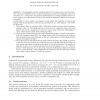Free Online Productivity Tools
i2Speak
i2Symbol
i2OCR
iTex2Img
iWeb2Print
iWeb2Shot
i2Type
iPdf2Split
iPdf2Merge
i2Bopomofo
i2Arabic
i2Style
i2Image
i2PDF
iLatex2Rtf
Sci2ools
CRYPTO
2010
Springer
2010
Springer
Leakage-Resilient Pseudorandom Functions and Side-Channel Attacks on Feistel Networks
Abstract. A cryptographic primitive is leakage-resilient, if it remains secure even if an adversary can learn a bounded amount of arbitrary information about the computation with every invocation. As a consequence, the physical implementation of a leakage-resilient primitive is secure against every side-channel as long as the amount of information leaked per invocation is bounded. In this paper we prove positive and negative results about the feasibility of constructing leakage-resilient pseudorandom functions and permutations (i.e. block-ciphers). Our results are three fold:
Arbitrary Information | CRYPTO 2010 | Cryptographic Primitive | Cryptology | Leakage-resilient Pseudorandom Functions |
| Added | 08 Nov 2010 |
| Updated | 08 Nov 2010 |
| Type | Conference |
| Year | 2010 |
| Where | CRYPTO |
| Authors | Yevgeniy Dodis, Krzysztof Pietrzak |
Comments (0)

